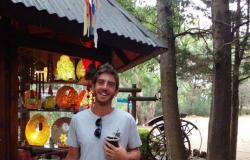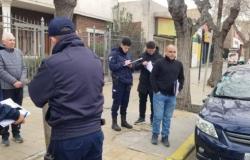The economic crisis affects all sectors of society. Rising cost of living and declining purchasing power They lead families to reevaluate their consumption habits and look for alternatives to stretch their budget. In the midst of this crisis, the Viedma shoe stores are experiencing a resurgence driven by need to maximize the useful life of durable goods. Local shoemakers, with decades of experience, are witnesses and protagonists of this change.
Daniel: «The type of clients changed»
Daniel Leal, a street shoemaker Tucumán has practiced this trade since his childhood, learning from his father. “I receive shoes for repair every day, Monday through Friday, and it’s almost permanent,” Leal said.
The economic crisis altered the profile of its clientele, “previously, people who bought good quality footwear and They threw it away when it was damaged, now they bring it in for repair. On the other hand, those who bought cheaper shoes, “Now they opt for even lower quality, which often makes it not worth repairing.”

Leal estimated that around 15 to 20 people enter his premises daily. «The type of clients changed, but not the quantity. Before, people who bought expensive sneakers would throw them away or give them away and buy new ones. Now, those same people prefer to repair them.
Regarding prices, he commented: «An arrangement of boots It costs between 35,000 and 40,000 pesos. The most common arrangements, such as a patch of sneakers, they range between 5,000 and 12,000 pesos».
Enzo: “People have no choice but to fix what they already have”
Enzo Tarruella has been in his shoe workshop on Álvaro Barros Street for 35 years. He learned his skill in his craft from a brother. Nowadays he works with his son and another brother: «It is a craft that has been passed down from generation to generation».

Despite high demand, it faces challenges due to high cost and shortage of inputs, «Sometimes, we don’t get the materials we need and we have to improvise with other things«.
Today, his workshop repairs all types of footwear, backpacks and boots. «LPeople have no choice but to fix what they already have. A simple fix, like gluing a pair of sneakers, can cost about 9,800 pesos, while more complex jobs can reach 38,000 pesos,” he added.

In an environment where money was scarce, repair became a basic necessity. «The input today is expensive and we have to order it from Bahía Blanca or Buenos Aires»Taruella mentioned. “A lot of people come and sometimes I can’t cope with the amount of work there is, today my workshop has a delay of 4 or 5 days in a row.”
Mario: “People don’t have money, and that affects everyone”
Mario, a shoemaker with 50 years of experience, started in this trade to survive and continued out of passion. He learned from his grandfather, an Italian shoemaker, and perfected his skills during military service, “I started working with a man on 25 de Mayo Street, and then a friend suggested I start a business in 1976, when Viedma was more or less 20,000 inhabitants.

Mario has maintained his workshop on Alem Street for 40 years. «People don’t have money, and that affects everyone. However, there have always been people who take care of their shoes and prefer to repair them,” he added.
In his workshop, Mario continues to see around 20 people a day. «People try to fix, the simplest fixes, like a seam, they cost 1,000 pesos, while more complex arrangements, such as changing the sole of police boots can cost up to 40,000 pesos«he commented.
The evolution of consumption and the impact of the crisis
The crisis transformed consumer behavior. «At the time, people would go and buy a pair of sneakers and throw away the old ones. “Today, today, they make them stretch,” Enzo points out. People who once bought high-quality shoes and replaced them frequently now choose to repair them.
Daniel observes that, in addition to the change in the type of customers, there is also a change in the quality of the footwear that is brought in for repair. «People who previously came with just enough to buy good shoes, today buy ones of poor quality, which makes it not always worth repairing them. However, they continue to look for arrangements because they have no other option.
Despite the challenges, these shoemakers adapted their skills and workshops to meet an ever-changing demand. “I’m in the same situation as everyone.”says Enzo. “People come for arrangements of all kinds, and we do what we can to help them.”













